Analyzing the Volkswagen Emissions Scandal
VerifiedAdded on 2020/05/28
|13
|4027
|470
AI Summary
This assignment requires students to analyze the Volkswagen emissions scandal. The focus is on understanding the ethical dimensions of the company's actions and exploring the consequences of their deception. Students need to draw upon various academic sources provided in the list to conduct a thorough analysis of the scandal and its impact.
Contribute Materials
Your contribution can guide someone’s learning journey. Share your
documents today.
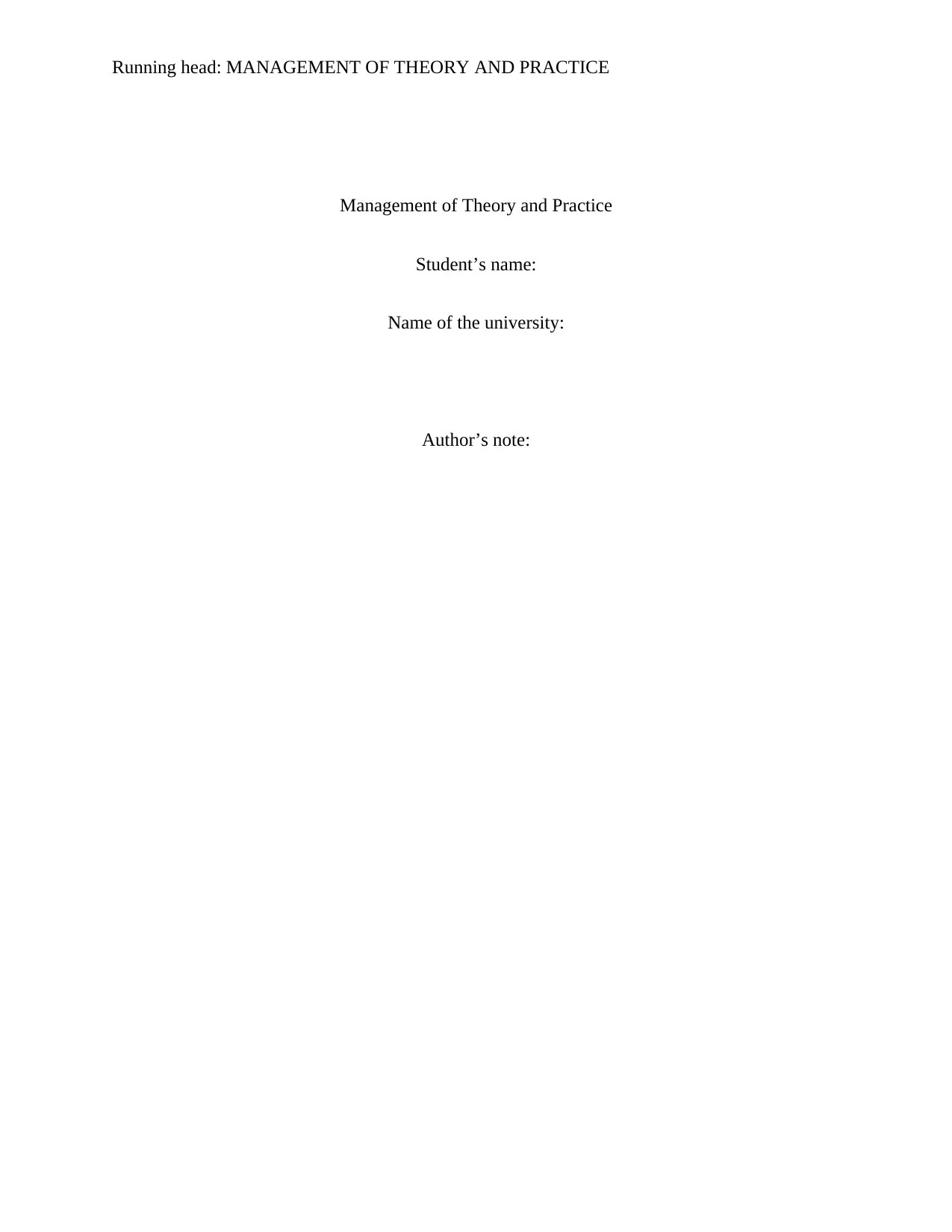
Running head: MANAGEMENT OF THEORY AND PRACTICE
Management of Theory and Practice
Student’s name:
Name of the university:
Author’s note:
Management of Theory and Practice
Student’s name:
Name of the university:
Author’s note:
Secure Best Marks with AI Grader
Need help grading? Try our AI Grader for instant feedback on your assignments.
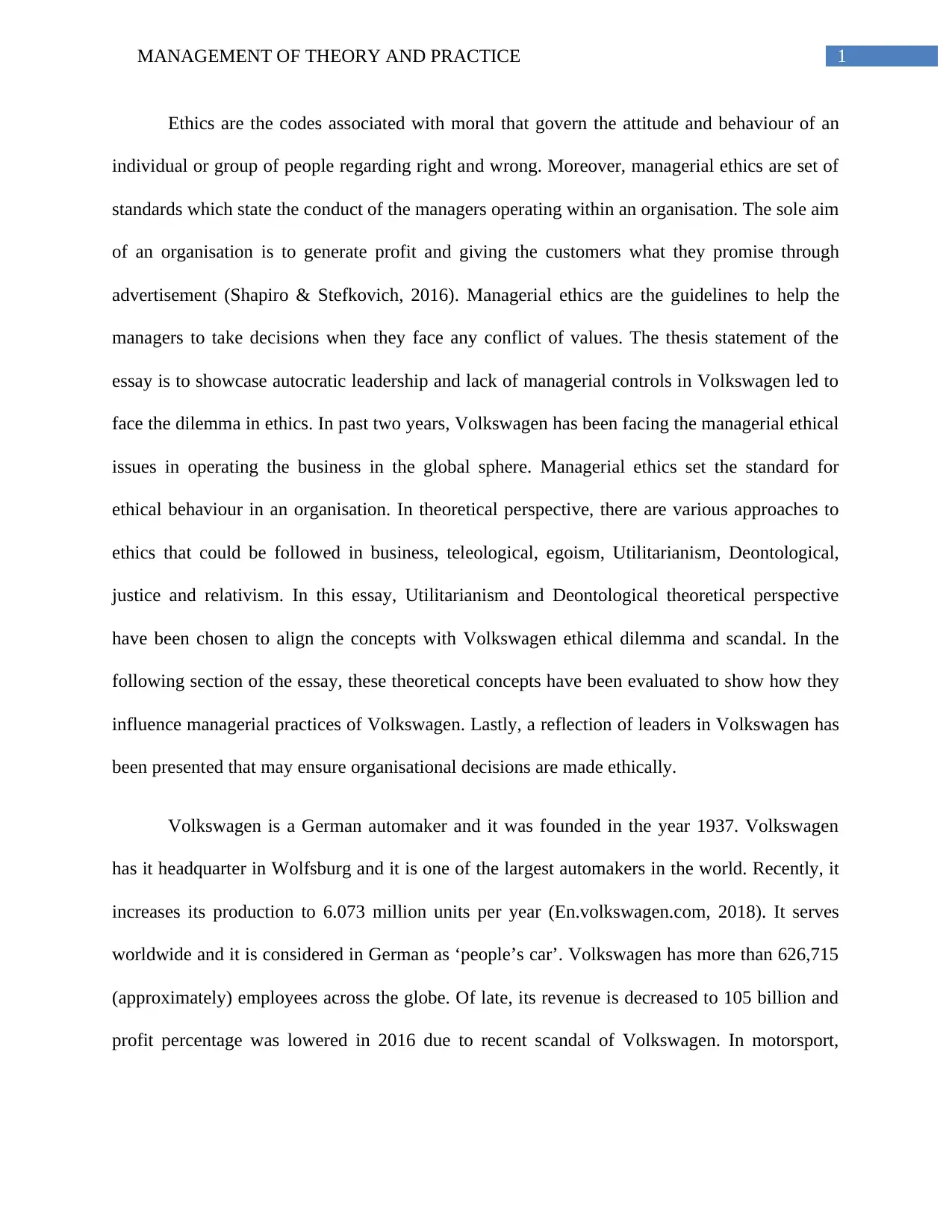
1MANAGEMENT OF THEORY AND PRACTICE
Ethics are the codes associated with moral that govern the attitude and behaviour of an
individual or group of people regarding right and wrong. Moreover, managerial ethics are set of
standards which state the conduct of the managers operating within an organisation. The sole aim
of an organisation is to generate profit and giving the customers what they promise through
advertisement (Shapiro & Stefkovich, 2016). Managerial ethics are the guidelines to help the
managers to take decisions when they face any conflict of values. The thesis statement of the
essay is to showcase autocratic leadership and lack of managerial controls in Volkswagen led to
face the dilemma in ethics. In past two years, Volkswagen has been facing the managerial ethical
issues in operating the business in the global sphere. Managerial ethics set the standard for
ethical behaviour in an organisation. In theoretical perspective, there are various approaches to
ethics that could be followed in business, teleological, egoism, Utilitarianism, Deontological,
justice and relativism. In this essay, Utilitarianism and Deontological theoretical perspective
have been chosen to align the concepts with Volkswagen ethical dilemma and scandal. In the
following section of the essay, these theoretical concepts have been evaluated to show how they
influence managerial practices of Volkswagen. Lastly, a reflection of leaders in Volkswagen has
been presented that may ensure organisational decisions are made ethically.
Volkswagen is a German automaker and it was founded in the year 1937. Volkswagen
has it headquarter in Wolfsburg and it is one of the largest automakers in the world. Recently, it
increases its production to 6.073 million units per year (En.volkswagen.com, 2018). It serves
worldwide and it is considered in German as ‘people’s car’. Volkswagen has more than 626,715
(approximately) employees across the globe. Of late, its revenue is decreased to 105 billion and
profit percentage was lowered in 2016 due to recent scandal of Volkswagen. In motorsport,
Ethics are the codes associated with moral that govern the attitude and behaviour of an
individual or group of people regarding right and wrong. Moreover, managerial ethics are set of
standards which state the conduct of the managers operating within an organisation. The sole aim
of an organisation is to generate profit and giving the customers what they promise through
advertisement (Shapiro & Stefkovich, 2016). Managerial ethics are the guidelines to help the
managers to take decisions when they face any conflict of values. The thesis statement of the
essay is to showcase autocratic leadership and lack of managerial controls in Volkswagen led to
face the dilemma in ethics. In past two years, Volkswagen has been facing the managerial ethical
issues in operating the business in the global sphere. Managerial ethics set the standard for
ethical behaviour in an organisation. In theoretical perspective, there are various approaches to
ethics that could be followed in business, teleological, egoism, Utilitarianism, Deontological,
justice and relativism. In this essay, Utilitarianism and Deontological theoretical perspective
have been chosen to align the concepts with Volkswagen ethical dilemma and scandal. In the
following section of the essay, these theoretical concepts have been evaluated to show how they
influence managerial practices of Volkswagen. Lastly, a reflection of leaders in Volkswagen has
been presented that may ensure organisational decisions are made ethically.
Volkswagen is a German automaker and it was founded in the year 1937. Volkswagen
has it headquarter in Wolfsburg and it is one of the largest automakers in the world. Recently, it
increases its production to 6.073 million units per year (En.volkswagen.com, 2018). It serves
worldwide and it is considered in German as ‘people’s car’. Volkswagen has more than 626,715
(approximately) employees across the globe. Of late, its revenue is decreased to 105 billion and
profit percentage was lowered in 2016 due to recent scandal of Volkswagen. In motorsport,
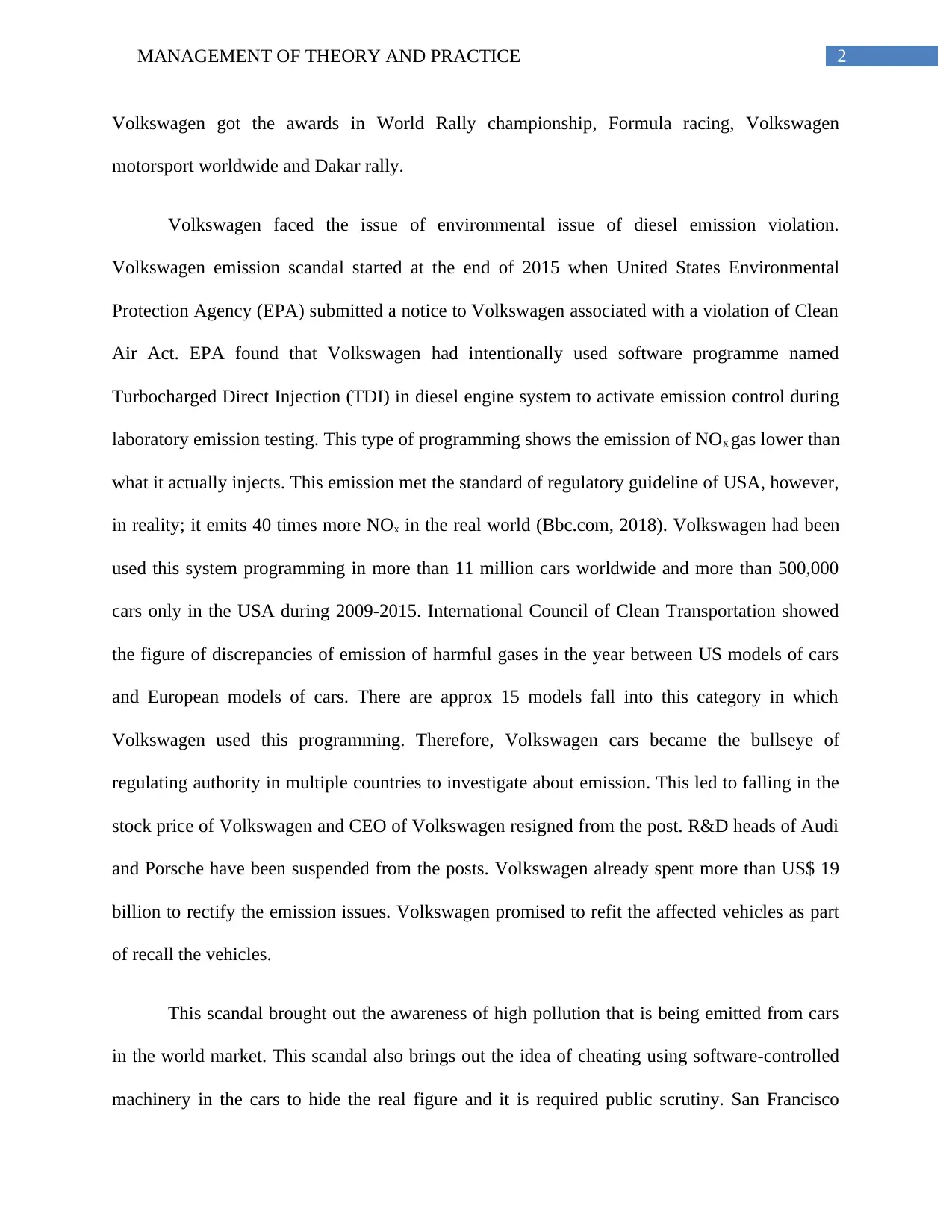
2MANAGEMENT OF THEORY AND PRACTICE
Volkswagen got the awards in World Rally championship, Formula racing, Volkswagen
motorsport worldwide and Dakar rally.
Volkswagen faced the issue of environmental issue of diesel emission violation.
Volkswagen emission scandal started at the end of 2015 when United States Environmental
Protection Agency (EPA) submitted a notice to Volkswagen associated with a violation of Clean
Air Act. EPA found that Volkswagen had intentionally used software programme named
Turbocharged Direct Injection (TDI) in diesel engine system to activate emission control during
laboratory emission testing. This type of programming shows the emission of NOx gas lower than
what it actually injects. This emission met the standard of regulatory guideline of USA, however,
in reality; it emits 40 times more NOx in the real world (Bbc.com, 2018). Volkswagen had been
used this system programming in more than 11 million cars worldwide and more than 500,000
cars only in the USA during 2009-2015. International Council of Clean Transportation showed
the figure of discrepancies of emission of harmful gases in the year between US models of cars
and European models of cars. There are approx 15 models fall into this category in which
Volkswagen used this programming. Therefore, Volkswagen cars became the bullseye of
regulating authority in multiple countries to investigate about emission. This led to falling in the
stock price of Volkswagen and CEO of Volkswagen resigned from the post. R&D heads of Audi
and Porsche have been suspended from the posts. Volkswagen already spent more than US$ 19
billion to rectify the emission issues. Volkswagen promised to refit the affected vehicles as part
of recall the vehicles.
This scandal brought out the awareness of high pollution that is being emitted from cars
in the world market. This scandal also brings out the idea of cheating using software-controlled
machinery in the cars to hide the real figure and it is required public scrutiny. San Francisco
Volkswagen got the awards in World Rally championship, Formula racing, Volkswagen
motorsport worldwide and Dakar rally.
Volkswagen faced the issue of environmental issue of diesel emission violation.
Volkswagen emission scandal started at the end of 2015 when United States Environmental
Protection Agency (EPA) submitted a notice to Volkswagen associated with a violation of Clean
Air Act. EPA found that Volkswagen had intentionally used software programme named
Turbocharged Direct Injection (TDI) in diesel engine system to activate emission control during
laboratory emission testing. This type of programming shows the emission of NOx gas lower than
what it actually injects. This emission met the standard of regulatory guideline of USA, however,
in reality; it emits 40 times more NOx in the real world (Bbc.com, 2018). Volkswagen had been
used this system programming in more than 11 million cars worldwide and more than 500,000
cars only in the USA during 2009-2015. International Council of Clean Transportation showed
the figure of discrepancies of emission of harmful gases in the year between US models of cars
and European models of cars. There are approx 15 models fall into this category in which
Volkswagen used this programming. Therefore, Volkswagen cars became the bullseye of
regulating authority in multiple countries to investigate about emission. This led to falling in the
stock price of Volkswagen and CEO of Volkswagen resigned from the post. R&D heads of Audi
and Porsche have been suspended from the posts. Volkswagen already spent more than US$ 19
billion to rectify the emission issues. Volkswagen promised to refit the affected vehicles as part
of recall the vehicles.
This scandal brought out the awareness of high pollution that is being emitted from cars
in the world market. This scandal also brings out the idea of cheating using software-controlled
machinery in the cars to hide the real figure and it is required public scrutiny. San Francisco
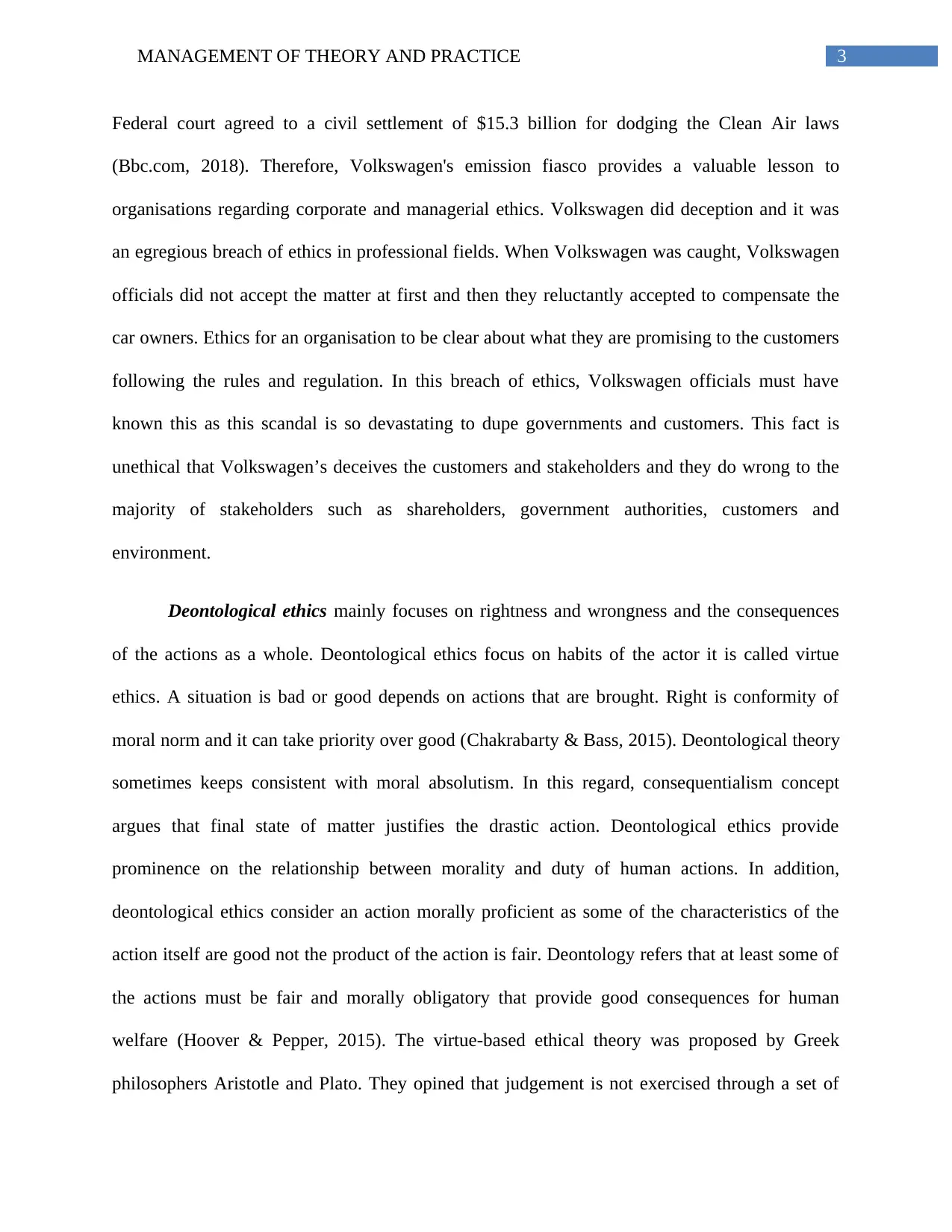
3MANAGEMENT OF THEORY AND PRACTICE
Federal court agreed to a civil settlement of $15.3 billion for dodging the Clean Air laws
(Bbc.com, 2018). Therefore, Volkswagen's emission fiasco provides a valuable lesson to
organisations regarding corporate and managerial ethics. Volkswagen did deception and it was
an egregious breach of ethics in professional fields. When Volkswagen was caught, Volkswagen
officials did not accept the matter at first and then they reluctantly accepted to compensate the
car owners. Ethics for an organisation to be clear about what they are promising to the customers
following the rules and regulation. In this breach of ethics, Volkswagen officials must have
known this as this scandal is so devastating to dupe governments and customers. This fact is
unethical that Volkswagen’s deceives the customers and stakeholders and they do wrong to the
majority of stakeholders such as shareholders, government authorities, customers and
environment.
Deontological ethics mainly focuses on rightness and wrongness and the consequences
of the actions as a whole. Deontological ethics focus on habits of the actor it is called virtue
ethics. A situation is bad or good depends on actions that are brought. Right is conformity of
moral norm and it can take priority over good (Chakrabarty & Bass, 2015). Deontological theory
sometimes keeps consistent with moral absolutism. In this regard, consequentialism concept
argues that final state of matter justifies the drastic action. Deontological ethics provide
prominence on the relationship between morality and duty of human actions. In addition,
deontological ethics consider an action morally proficient as some of the characteristics of the
action itself are good not the product of the action is fair. Deontology refers that at least some of
the actions must be fair and morally obligatory that provide good consequences for human
welfare (Hoover & Pepper, 2015). The virtue-based ethical theory was proposed by Greek
philosophers Aristotle and Plato. They opined that judgement is not exercised through a set of
Federal court agreed to a civil settlement of $15.3 billion for dodging the Clean Air laws
(Bbc.com, 2018). Therefore, Volkswagen's emission fiasco provides a valuable lesson to
organisations regarding corporate and managerial ethics. Volkswagen did deception and it was
an egregious breach of ethics in professional fields. When Volkswagen was caught, Volkswagen
officials did not accept the matter at first and then they reluctantly accepted to compensate the
car owners. Ethics for an organisation to be clear about what they are promising to the customers
following the rules and regulation. In this breach of ethics, Volkswagen officials must have
known this as this scandal is so devastating to dupe governments and customers. This fact is
unethical that Volkswagen’s deceives the customers and stakeholders and they do wrong to the
majority of stakeholders such as shareholders, government authorities, customers and
environment.
Deontological ethics mainly focuses on rightness and wrongness and the consequences
of the actions as a whole. Deontological ethics focus on habits of the actor it is called virtue
ethics. A situation is bad or good depends on actions that are brought. Right is conformity of
moral norm and it can take priority over good (Chakrabarty & Bass, 2015). Deontological theory
sometimes keeps consistent with moral absolutism. In this regard, consequentialism concept
argues that final state of matter justifies the drastic action. Deontological ethics provide
prominence on the relationship between morality and duty of human actions. In addition,
deontological ethics consider an action morally proficient as some of the characteristics of the
action itself are good not the product of the action is fair. Deontology refers that at least some of
the actions must be fair and morally obligatory that provide good consequences for human
welfare (Hoover & Pepper, 2015). The virtue-based ethical theory was proposed by Greek
philosophers Aristotle and Plato. They opined that judgement is not exercised through a set of
Secure Best Marks with AI Grader
Need help grading? Try our AI Grader for instant feedback on your assignments.
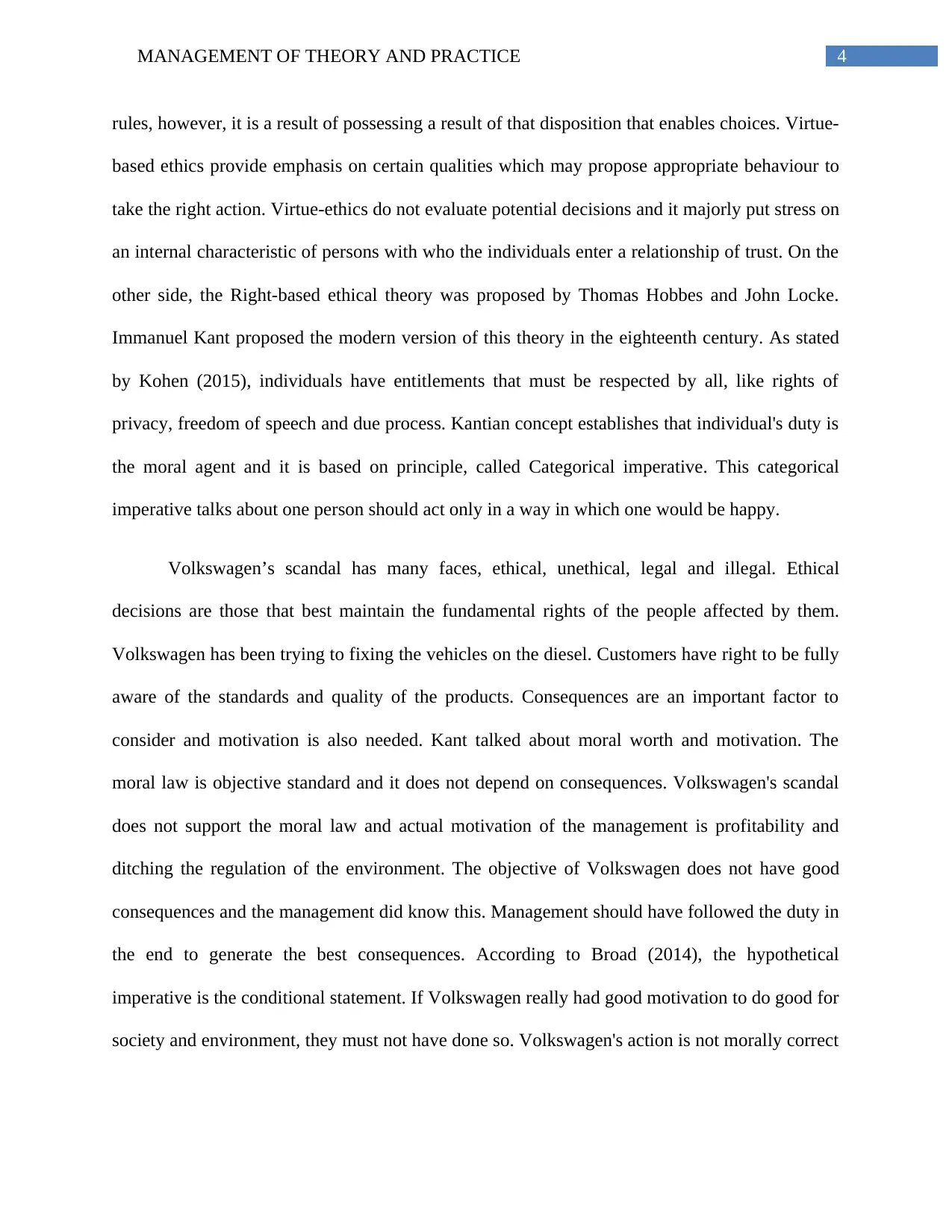
4MANAGEMENT OF THEORY AND PRACTICE
rules, however, it is a result of possessing a result of that disposition that enables choices. Virtue-
based ethics provide emphasis on certain qualities which may propose appropriate behaviour to
take the right action. Virtue-ethics do not evaluate potential decisions and it majorly put stress on
an internal characteristic of persons with who the individuals enter a relationship of trust. On the
other side, the Right-based ethical theory was proposed by Thomas Hobbes and John Locke.
Immanuel Kant proposed the modern version of this theory in the eighteenth century. As stated
by Kohen (2015), individuals have entitlements that must be respected by all, like rights of
privacy, freedom of speech and due process. Kantian concept establishes that individual's duty is
the moral agent and it is based on principle, called Categorical imperative. This categorical
imperative talks about one person should act only in a way in which one would be happy.
Volkswagen’s scandal has many faces, ethical, unethical, legal and illegal. Ethical
decisions are those that best maintain the fundamental rights of the people affected by them.
Volkswagen has been trying to fixing the vehicles on the diesel. Customers have right to be fully
aware of the standards and quality of the products. Consequences are an important factor to
consider and motivation is also needed. Kant talked about moral worth and motivation. The
moral law is objective standard and it does not depend on consequences. Volkswagen's scandal
does not support the moral law and actual motivation of the management is profitability and
ditching the regulation of the environment. The objective of Volkswagen does not have good
consequences and the management did know this. Management should have followed the duty in
the end to generate the best consequences. According to Broad (2014), the hypothetical
imperative is the conditional statement. If Volkswagen really had good motivation to do good for
society and environment, they must not have done so. Volkswagen's action is not morally correct
rules, however, it is a result of possessing a result of that disposition that enables choices. Virtue-
based ethics provide emphasis on certain qualities which may propose appropriate behaviour to
take the right action. Virtue-ethics do not evaluate potential decisions and it majorly put stress on
an internal characteristic of persons with who the individuals enter a relationship of trust. On the
other side, the Right-based ethical theory was proposed by Thomas Hobbes and John Locke.
Immanuel Kant proposed the modern version of this theory in the eighteenth century. As stated
by Kohen (2015), individuals have entitlements that must be respected by all, like rights of
privacy, freedom of speech and due process. Kantian concept establishes that individual's duty is
the moral agent and it is based on principle, called Categorical imperative. This categorical
imperative talks about one person should act only in a way in which one would be happy.
Volkswagen’s scandal has many faces, ethical, unethical, legal and illegal. Ethical
decisions are those that best maintain the fundamental rights of the people affected by them.
Volkswagen has been trying to fixing the vehicles on the diesel. Customers have right to be fully
aware of the standards and quality of the products. Consequences are an important factor to
consider and motivation is also needed. Kant talked about moral worth and motivation. The
moral law is objective standard and it does not depend on consequences. Volkswagen's scandal
does not support the moral law and actual motivation of the management is profitability and
ditching the regulation of the environment. The objective of Volkswagen does not have good
consequences and the management did know this. Management should have followed the duty in
the end to generate the best consequences. According to Broad (2014), the hypothetical
imperative is the conditional statement. If Volkswagen really had good motivation to do good for
society and environment, they must not have done so. Volkswagen's action is not morally correct
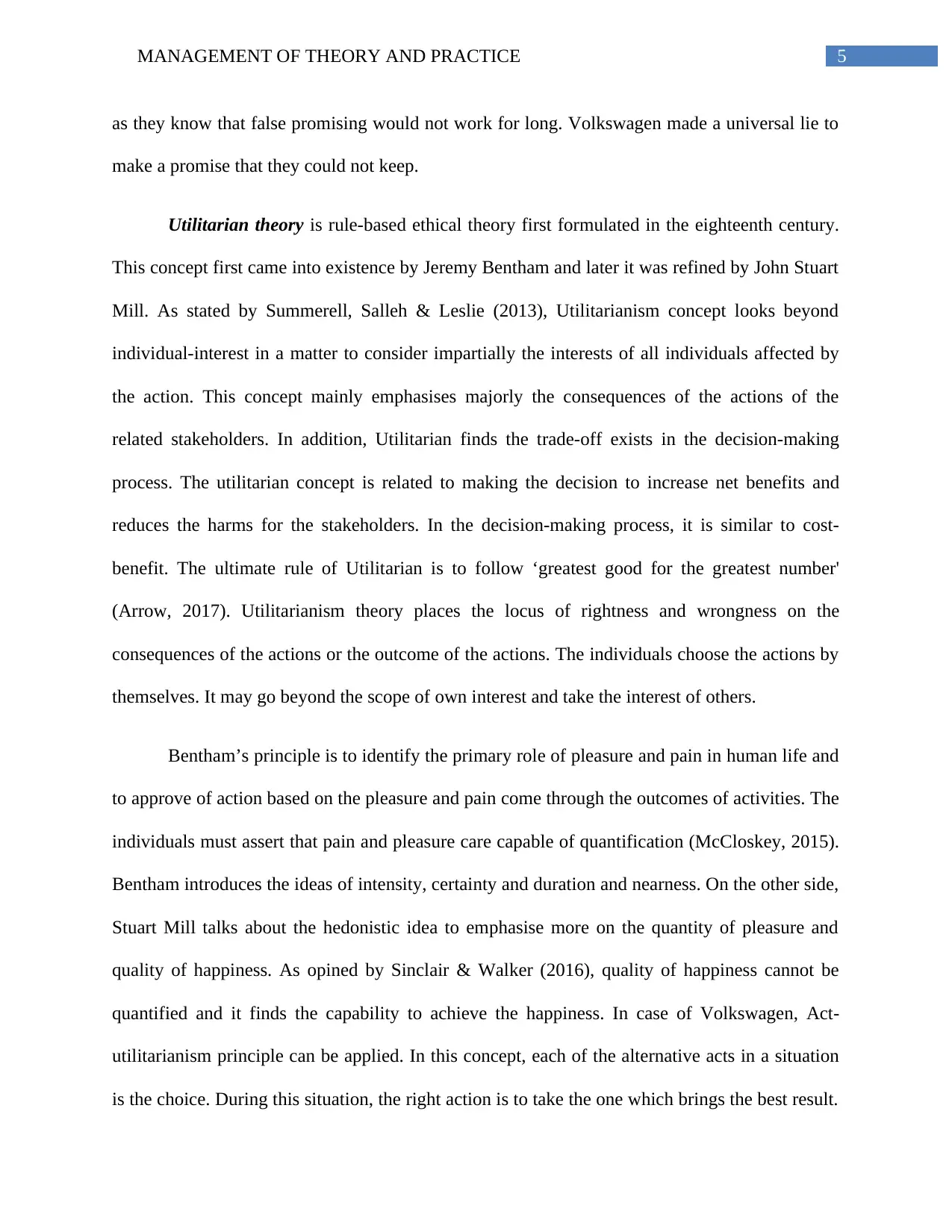
5MANAGEMENT OF THEORY AND PRACTICE
as they know that false promising would not work for long. Volkswagen made a universal lie to
make a promise that they could not keep.
Utilitarian theory is rule-based ethical theory first formulated in the eighteenth century.
This concept first came into existence by Jeremy Bentham and later it was refined by John Stuart
Mill. As stated by Summerell, Salleh & Leslie (2013), Utilitarianism concept looks beyond
individual-interest in a matter to consider impartially the interests of all individuals affected by
the action. This concept mainly emphasises majorly the consequences of the actions of the
related stakeholders. In addition, Utilitarian finds the trade-off exists in the decision-making
process. The utilitarian concept is related to making the decision to increase net benefits and
reduces the harms for the stakeholders. In the decision-making process, it is similar to cost-
benefit. The ultimate rule of Utilitarian is to follow ‘greatest good for the greatest number'
(Arrow, 2017). Utilitarianism theory places the locus of rightness and wrongness on the
consequences of the actions or the outcome of the actions. The individuals choose the actions by
themselves. It may go beyond the scope of own interest and take the interest of others.
Bentham’s principle is to identify the primary role of pleasure and pain in human life and
to approve of action based on the pleasure and pain come through the outcomes of activities. The
individuals must assert that pain and pleasure care capable of quantification (McCloskey, 2015).
Bentham introduces the ideas of intensity, certainty and duration and nearness. On the other side,
Stuart Mill talks about the hedonistic idea to emphasise more on the quantity of pleasure and
quality of happiness. As opined by Sinclair & Walker (2016), quality of happiness cannot be
quantified and it finds the capability to achieve the happiness. In case of Volkswagen, Act-
utilitarianism principle can be applied. In this concept, each of the alternative acts in a situation
is the choice. During this situation, the right action is to take the one which brings the best result.
as they know that false promising would not work for long. Volkswagen made a universal lie to
make a promise that they could not keep.
Utilitarian theory is rule-based ethical theory first formulated in the eighteenth century.
This concept first came into existence by Jeremy Bentham and later it was refined by John Stuart
Mill. As stated by Summerell, Salleh & Leslie (2013), Utilitarianism concept looks beyond
individual-interest in a matter to consider impartially the interests of all individuals affected by
the action. This concept mainly emphasises majorly the consequences of the actions of the
related stakeholders. In addition, Utilitarian finds the trade-off exists in the decision-making
process. The utilitarian concept is related to making the decision to increase net benefits and
reduces the harms for the stakeholders. In the decision-making process, it is similar to cost-
benefit. The ultimate rule of Utilitarian is to follow ‘greatest good for the greatest number'
(Arrow, 2017). Utilitarianism theory places the locus of rightness and wrongness on the
consequences of the actions or the outcome of the actions. The individuals choose the actions by
themselves. It may go beyond the scope of own interest and take the interest of others.
Bentham’s principle is to identify the primary role of pleasure and pain in human life and
to approve of action based on the pleasure and pain come through the outcomes of activities. The
individuals must assert that pain and pleasure care capable of quantification (McCloskey, 2015).
Bentham introduces the ideas of intensity, certainty and duration and nearness. On the other side,
Stuart Mill talks about the hedonistic idea to emphasise more on the quantity of pleasure and
quality of happiness. As opined by Sinclair & Walker (2016), quality of happiness cannot be
quantified and it finds the capability to achieve the happiness. In case of Volkswagen, Act-
utilitarianism principle can be applied. In this concept, each of the alternative acts in a situation
is the choice. During this situation, the right action is to take the one which brings the best result.
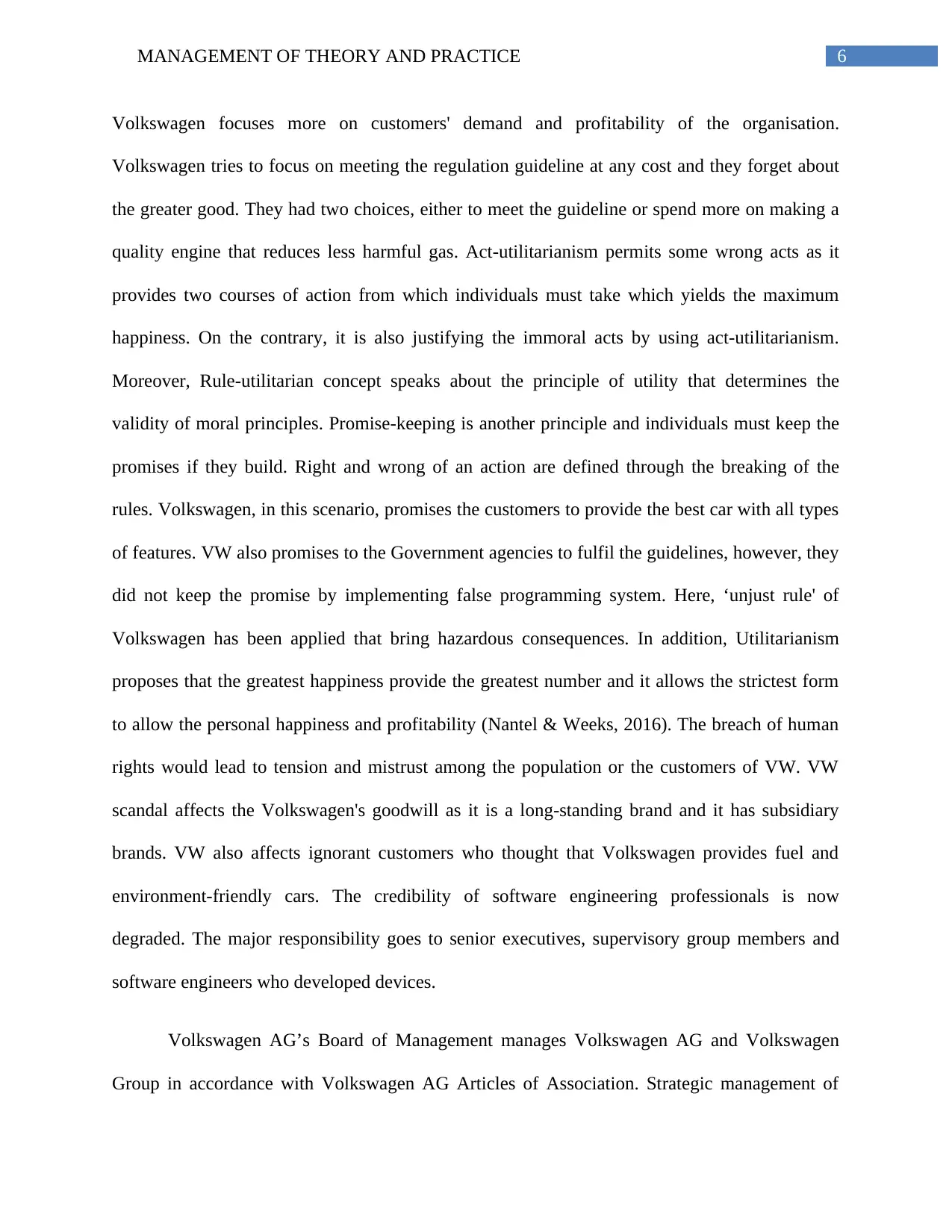
6MANAGEMENT OF THEORY AND PRACTICE
Volkswagen focuses more on customers' demand and profitability of the organisation.
Volkswagen tries to focus on meeting the regulation guideline at any cost and they forget about
the greater good. They had two choices, either to meet the guideline or spend more on making a
quality engine that reduces less harmful gas. Act-utilitarianism permits some wrong acts as it
provides two courses of action from which individuals must take which yields the maximum
happiness. On the contrary, it is also justifying the immoral acts by using act-utilitarianism.
Moreover, Rule-utilitarian concept speaks about the principle of utility that determines the
validity of moral principles. Promise-keeping is another principle and individuals must keep the
promises if they build. Right and wrong of an action are defined through the breaking of the
rules. Volkswagen, in this scenario, promises the customers to provide the best car with all types
of features. VW also promises to the Government agencies to fulfil the guidelines, however, they
did not keep the promise by implementing false programming system. Here, ‘unjust rule' of
Volkswagen has been applied that bring hazardous consequences. In addition, Utilitarianism
proposes that the greatest happiness provide the greatest number and it allows the strictest form
to allow the personal happiness and profitability (Nantel & Weeks, 2016). The breach of human
rights would lead to tension and mistrust among the population or the customers of VW. VW
scandal affects the Volkswagen's goodwill as it is a long-standing brand and it has subsidiary
brands. VW also affects ignorant customers who thought that Volkswagen provides fuel and
environment-friendly cars. The credibility of software engineering professionals is now
degraded. The major responsibility goes to senior executives, supervisory group members and
software engineers who developed devices.
Volkswagen AG’s Board of Management manages Volkswagen AG and Volkswagen
Group in accordance with Volkswagen AG Articles of Association. Strategic management of
Volkswagen focuses more on customers' demand and profitability of the organisation.
Volkswagen tries to focus on meeting the regulation guideline at any cost and they forget about
the greater good. They had two choices, either to meet the guideline or spend more on making a
quality engine that reduces less harmful gas. Act-utilitarianism permits some wrong acts as it
provides two courses of action from which individuals must take which yields the maximum
happiness. On the contrary, it is also justifying the immoral acts by using act-utilitarianism.
Moreover, Rule-utilitarian concept speaks about the principle of utility that determines the
validity of moral principles. Promise-keeping is another principle and individuals must keep the
promises if they build. Right and wrong of an action are defined through the breaking of the
rules. Volkswagen, in this scenario, promises the customers to provide the best car with all types
of features. VW also promises to the Government agencies to fulfil the guidelines, however, they
did not keep the promise by implementing false programming system. Here, ‘unjust rule' of
Volkswagen has been applied that bring hazardous consequences. In addition, Utilitarianism
proposes that the greatest happiness provide the greatest number and it allows the strictest form
to allow the personal happiness and profitability (Nantel & Weeks, 2016). The breach of human
rights would lead to tension and mistrust among the population or the customers of VW. VW
scandal affects the Volkswagen's goodwill as it is a long-standing brand and it has subsidiary
brands. VW also affects ignorant customers who thought that Volkswagen provides fuel and
environment-friendly cars. The credibility of software engineering professionals is now
degraded. The major responsibility goes to senior executives, supervisory group members and
software engineers who developed devices.
Volkswagen AG’s Board of Management manages Volkswagen AG and Volkswagen
Group in accordance with Volkswagen AG Articles of Association. Strategic management of
Paraphrase This Document
Need a fresh take? Get an instant paraphrase of this document with our AI Paraphraser
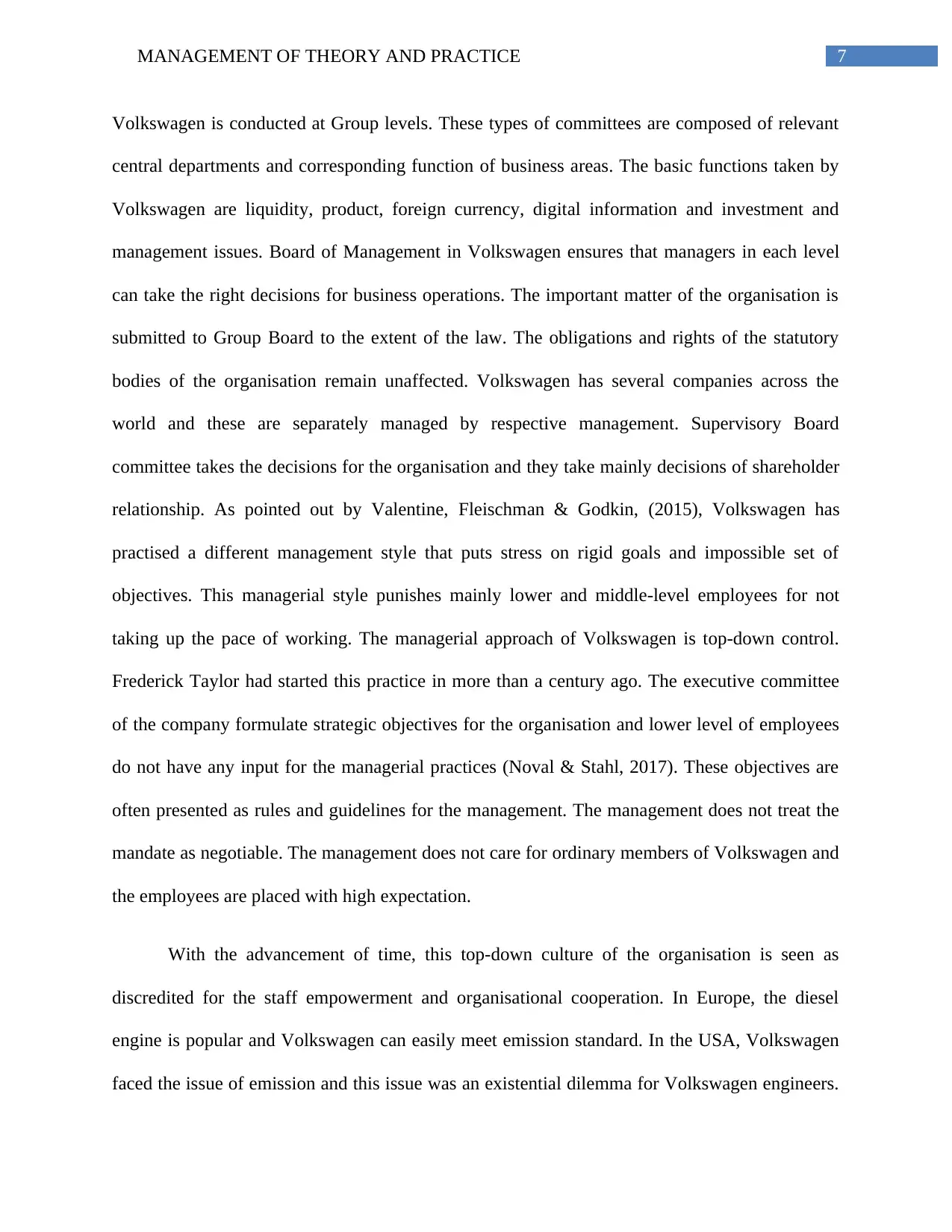
7MANAGEMENT OF THEORY AND PRACTICE
Volkswagen is conducted at Group levels. These types of committees are composed of relevant
central departments and corresponding function of business areas. The basic functions taken by
Volkswagen are liquidity, product, foreign currency, digital information and investment and
management issues. Board of Management in Volkswagen ensures that managers in each level
can take the right decisions for business operations. The important matter of the organisation is
submitted to Group Board to the extent of the law. The obligations and rights of the statutory
bodies of the organisation remain unaffected. Volkswagen has several companies across the
world and these are separately managed by respective management. Supervisory Board
committee takes the decisions for the organisation and they take mainly decisions of shareholder
relationship. As pointed out by Valentine, Fleischman & Godkin, (2015), Volkswagen has
practised a different management style that puts stress on rigid goals and impossible set of
objectives. This managerial style punishes mainly lower and middle-level employees for not
taking up the pace of working. The managerial approach of Volkswagen is top-down control.
Frederick Taylor had started this practice in more than a century ago. The executive committee
of the company formulate strategic objectives for the organisation and lower level of employees
do not have any input for the managerial practices (Noval & Stahl, 2017). These objectives are
often presented as rules and guidelines for the management. The management does not treat the
mandate as negotiable. The management does not care for ordinary members of Volkswagen and
the employees are placed with high expectation.
With the advancement of time, this top-down culture of the organisation is seen as
discredited for the staff empowerment and organisational cooperation. In Europe, the diesel
engine is popular and Volkswagen can easily meet emission standard. In the USA, Volkswagen
faced the issue of emission and this issue was an existential dilemma for Volkswagen engineers.
Volkswagen is conducted at Group levels. These types of committees are composed of relevant
central departments and corresponding function of business areas. The basic functions taken by
Volkswagen are liquidity, product, foreign currency, digital information and investment and
management issues. Board of Management in Volkswagen ensures that managers in each level
can take the right decisions for business operations. The important matter of the organisation is
submitted to Group Board to the extent of the law. The obligations and rights of the statutory
bodies of the organisation remain unaffected. Volkswagen has several companies across the
world and these are separately managed by respective management. Supervisory Board
committee takes the decisions for the organisation and they take mainly decisions of shareholder
relationship. As pointed out by Valentine, Fleischman & Godkin, (2015), Volkswagen has
practised a different management style that puts stress on rigid goals and impossible set of
objectives. This managerial style punishes mainly lower and middle-level employees for not
taking up the pace of working. The managerial approach of Volkswagen is top-down control.
Frederick Taylor had started this practice in more than a century ago. The executive committee
of the company formulate strategic objectives for the organisation and lower level of employees
do not have any input for the managerial practices (Noval & Stahl, 2017). These objectives are
often presented as rules and guidelines for the management. The management does not treat the
mandate as negotiable. The management does not care for ordinary members of Volkswagen and
the employees are placed with high expectation.
With the advancement of time, this top-down culture of the organisation is seen as
discredited for the staff empowerment and organisational cooperation. In Europe, the diesel
engine is popular and Volkswagen can easily meet emission standard. In the USA, Volkswagen
faced the issue of emission and this issue was an existential dilemma for Volkswagen engineers.
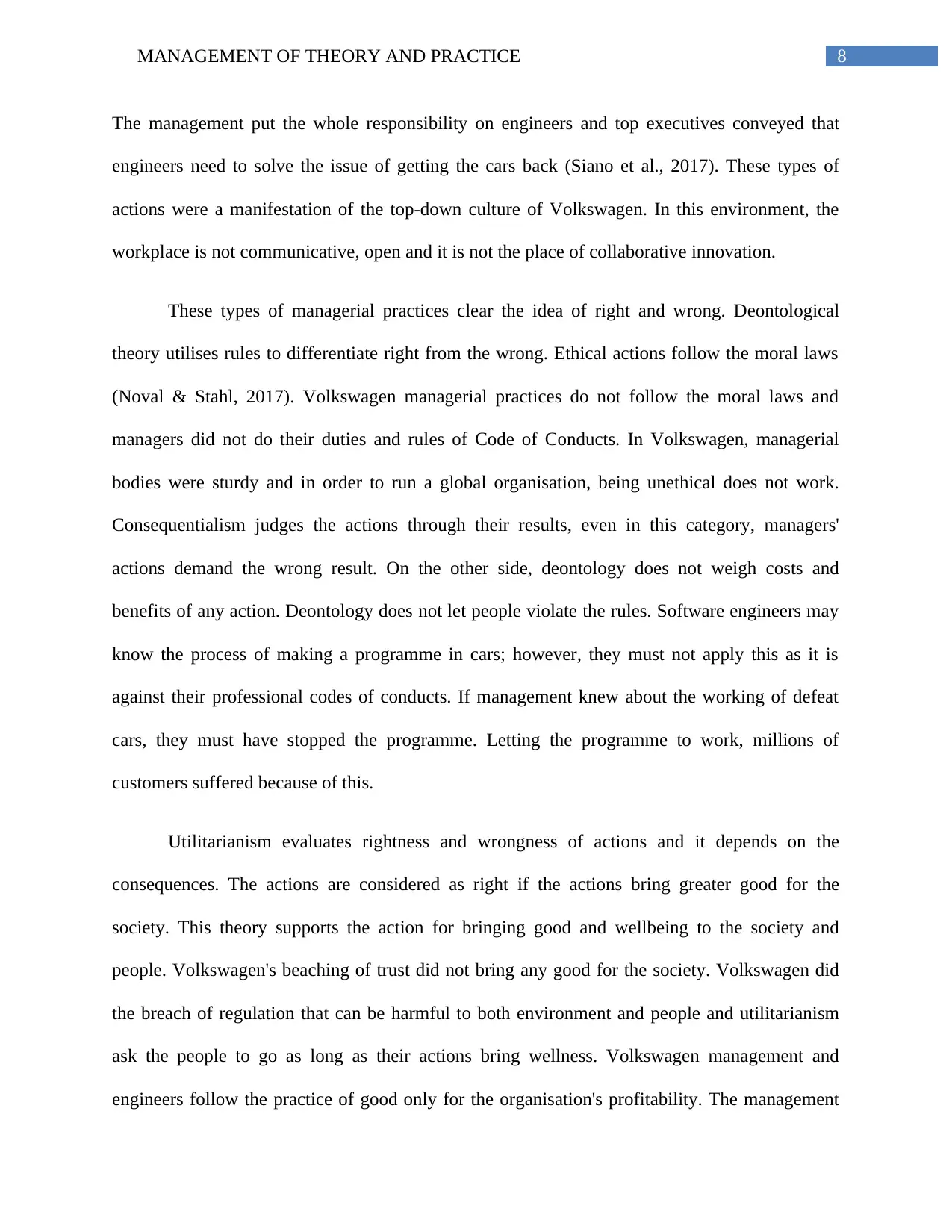
8MANAGEMENT OF THEORY AND PRACTICE
The management put the whole responsibility on engineers and top executives conveyed that
engineers need to solve the issue of getting the cars back (Siano et al., 2017). These types of
actions were a manifestation of the top-down culture of Volkswagen. In this environment, the
workplace is not communicative, open and it is not the place of collaborative innovation.
These types of managerial practices clear the idea of right and wrong. Deontological
theory utilises rules to differentiate right from the wrong. Ethical actions follow the moral laws
(Noval & Stahl, 2017). Volkswagen managerial practices do not follow the moral laws and
managers did not do their duties and rules of Code of Conducts. In Volkswagen, managerial
bodies were sturdy and in order to run a global organisation, being unethical does not work.
Consequentialism judges the actions through their results, even in this category, managers'
actions demand the wrong result. On the other side, deontology does not weigh costs and
benefits of any action. Deontology does not let people violate the rules. Software engineers may
know the process of making a programme in cars; however, they must not apply this as it is
against their professional codes of conducts. If management knew about the working of defeat
cars, they must have stopped the programme. Letting the programme to work, millions of
customers suffered because of this.
Utilitarianism evaluates rightness and wrongness of actions and it depends on the
consequences. The actions are considered as right if the actions bring greater good for the
society. This theory supports the action for bringing good and wellbeing to the society and
people. Volkswagen's beaching of trust did not bring any good for the society. Volkswagen did
the breach of regulation that can be harmful to both environment and people and utilitarianism
ask the people to go as long as their actions bring wellness. Volkswagen management and
engineers follow the practice of good only for the organisation's profitability. The management
The management put the whole responsibility on engineers and top executives conveyed that
engineers need to solve the issue of getting the cars back (Siano et al., 2017). These types of
actions were a manifestation of the top-down culture of Volkswagen. In this environment, the
workplace is not communicative, open and it is not the place of collaborative innovation.
These types of managerial practices clear the idea of right and wrong. Deontological
theory utilises rules to differentiate right from the wrong. Ethical actions follow the moral laws
(Noval & Stahl, 2017). Volkswagen managerial practices do not follow the moral laws and
managers did not do their duties and rules of Code of Conducts. In Volkswagen, managerial
bodies were sturdy and in order to run a global organisation, being unethical does not work.
Consequentialism judges the actions through their results, even in this category, managers'
actions demand the wrong result. On the other side, deontology does not weigh costs and
benefits of any action. Deontology does not let people violate the rules. Software engineers may
know the process of making a programme in cars; however, they must not apply this as it is
against their professional codes of conducts. If management knew about the working of defeat
cars, they must have stopped the programme. Letting the programme to work, millions of
customers suffered because of this.
Utilitarianism evaluates rightness and wrongness of actions and it depends on the
consequences. The actions are considered as right if the actions bring greater good for the
society. This theory supports the action for bringing good and wellbeing to the society and
people. Volkswagen's beaching of trust did not bring any good for the society. Volkswagen did
the breach of regulation that can be harmful to both environment and people and utilitarianism
ask the people to go as long as their actions bring wellness. Volkswagen management and
engineers follow the practice of good only for the organisation's profitability. The management
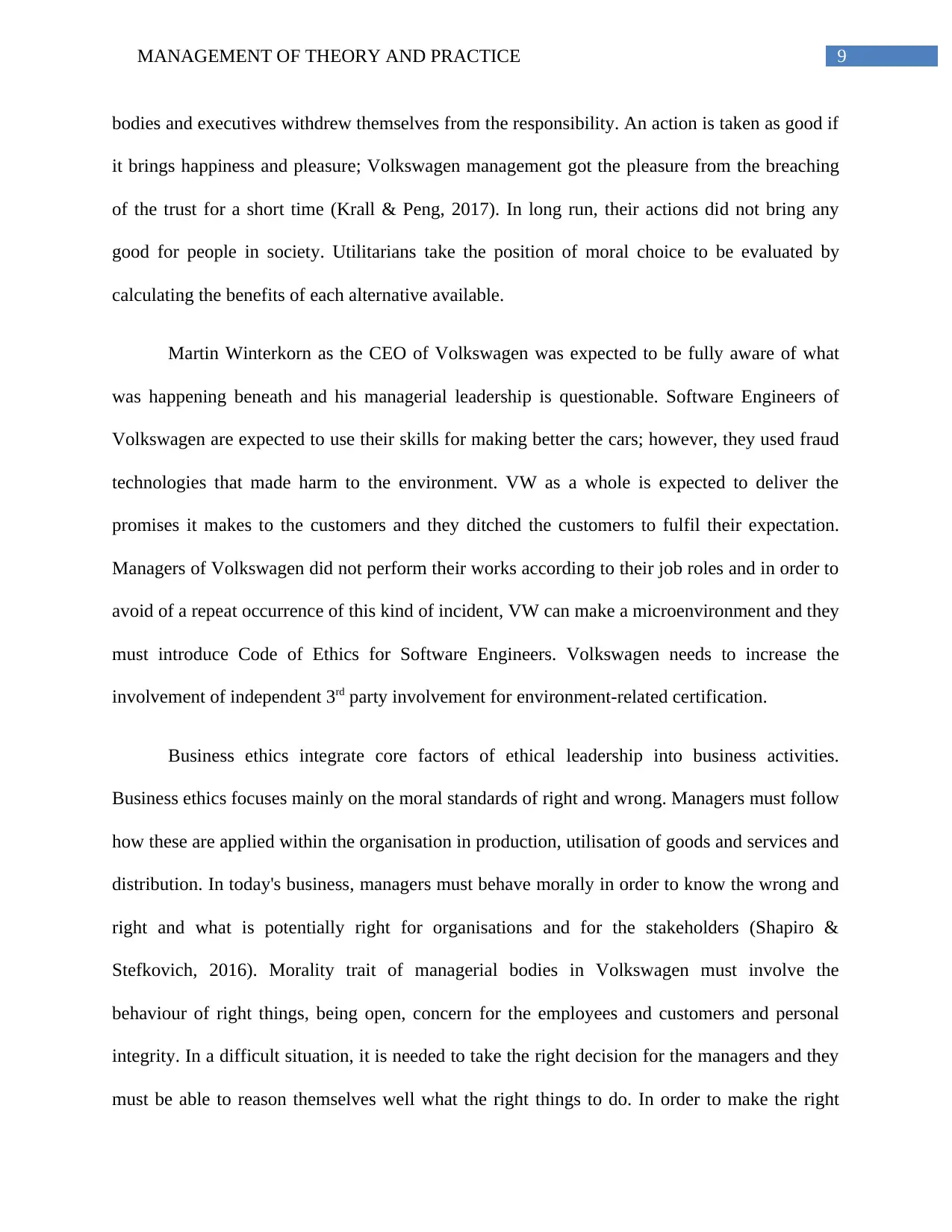
9MANAGEMENT OF THEORY AND PRACTICE
bodies and executives withdrew themselves from the responsibility. An action is taken as good if
it brings happiness and pleasure; Volkswagen management got the pleasure from the breaching
of the trust for a short time (Krall & Peng, 2017). In long run, their actions did not bring any
good for people in society. Utilitarians take the position of moral choice to be evaluated by
calculating the benefits of each alternative available.
Martin Winterkorn as the CEO of Volkswagen was expected to be fully aware of what
was happening beneath and his managerial leadership is questionable. Software Engineers of
Volkswagen are expected to use their skills for making better the cars; however, they used fraud
technologies that made harm to the environment. VW as a whole is expected to deliver the
promises it makes to the customers and they ditched the customers to fulfil their expectation.
Managers of Volkswagen did not perform their works according to their job roles and in order to
avoid of a repeat occurrence of this kind of incident, VW can make a microenvironment and they
must introduce Code of Ethics for Software Engineers. Volkswagen needs to increase the
involvement of independent 3rd party involvement for environment-related certification.
Business ethics integrate core factors of ethical leadership into business activities.
Business ethics focuses mainly on the moral standards of right and wrong. Managers must follow
how these are applied within the organisation in production, utilisation of goods and services and
distribution. In today's business, managers must behave morally in order to know the wrong and
right and what is potentially right for organisations and for the stakeholders (Shapiro &
Stefkovich, 2016). Morality trait of managerial bodies in Volkswagen must involve the
behaviour of right things, being open, concern for the employees and customers and personal
integrity. In a difficult situation, it is needed to take the right decision for the managers and they
must be able to reason themselves well what the right things to do. In order to make the right
bodies and executives withdrew themselves from the responsibility. An action is taken as good if
it brings happiness and pleasure; Volkswagen management got the pleasure from the breaching
of the trust for a short time (Krall & Peng, 2017). In long run, their actions did not bring any
good for people in society. Utilitarians take the position of moral choice to be evaluated by
calculating the benefits of each alternative available.
Martin Winterkorn as the CEO of Volkswagen was expected to be fully aware of what
was happening beneath and his managerial leadership is questionable. Software Engineers of
Volkswagen are expected to use their skills for making better the cars; however, they used fraud
technologies that made harm to the environment. VW as a whole is expected to deliver the
promises it makes to the customers and they ditched the customers to fulfil their expectation.
Managers of Volkswagen did not perform their works according to their job roles and in order to
avoid of a repeat occurrence of this kind of incident, VW can make a microenvironment and they
must introduce Code of Ethics for Software Engineers. Volkswagen needs to increase the
involvement of independent 3rd party involvement for environment-related certification.
Business ethics integrate core factors of ethical leadership into business activities.
Business ethics focuses mainly on the moral standards of right and wrong. Managers must follow
how these are applied within the organisation in production, utilisation of goods and services and
distribution. In today's business, managers must behave morally in order to know the wrong and
right and what is potentially right for organisations and for the stakeholders (Shapiro &
Stefkovich, 2016). Morality trait of managerial bodies in Volkswagen must involve the
behaviour of right things, being open, concern for the employees and customers and personal
integrity. In a difficult situation, it is needed to take the right decision for the managers and they
must be able to reason themselves well what the right things to do. In order to make the right
Secure Best Marks with AI Grader
Need help grading? Try our AI Grader for instant feedback on your assignments.
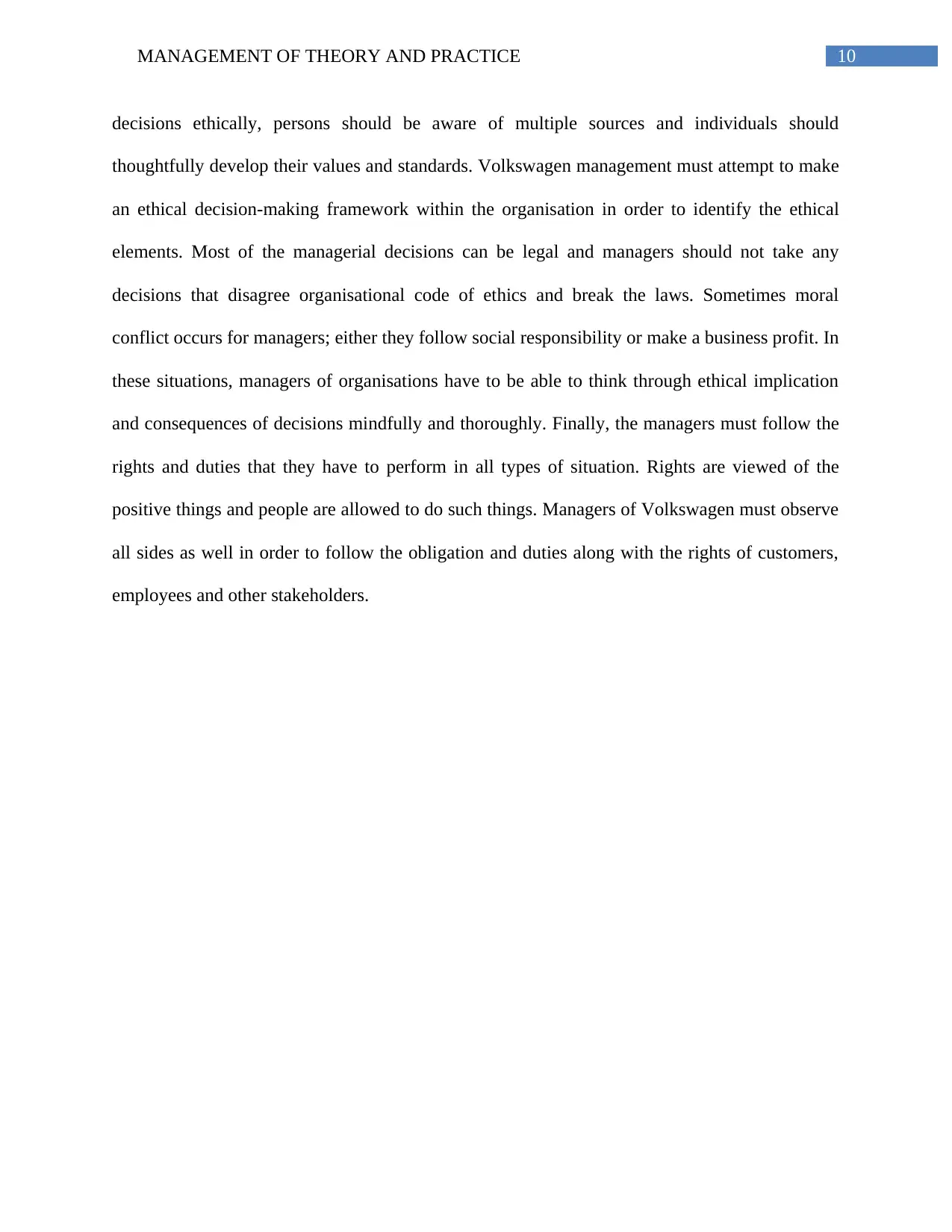
10MANAGEMENT OF THEORY AND PRACTICE
decisions ethically, persons should be aware of multiple sources and individuals should
thoughtfully develop their values and standards. Volkswagen management must attempt to make
an ethical decision-making framework within the organisation in order to identify the ethical
elements. Most of the managerial decisions can be legal and managers should not take any
decisions that disagree organisational code of ethics and break the laws. Sometimes moral
conflict occurs for managers; either they follow social responsibility or make a business profit. In
these situations, managers of organisations have to be able to think through ethical implication
and consequences of decisions mindfully and thoroughly. Finally, the managers must follow the
rights and duties that they have to perform in all types of situation. Rights are viewed of the
positive things and people are allowed to do such things. Managers of Volkswagen must observe
all sides as well in order to follow the obligation and duties along with the rights of customers,
employees and other stakeholders.
decisions ethically, persons should be aware of multiple sources and individuals should
thoughtfully develop their values and standards. Volkswagen management must attempt to make
an ethical decision-making framework within the organisation in order to identify the ethical
elements. Most of the managerial decisions can be legal and managers should not take any
decisions that disagree organisational code of ethics and break the laws. Sometimes moral
conflict occurs for managers; either they follow social responsibility or make a business profit. In
these situations, managers of organisations have to be able to think through ethical implication
and consequences of decisions mindfully and thoroughly. Finally, the managers must follow the
rights and duties that they have to perform in all types of situation. Rights are viewed of the
positive things and people are allowed to do such things. Managers of Volkswagen must observe
all sides as well in order to follow the obligation and duties along with the rights of customers,
employees and other stakeholders.
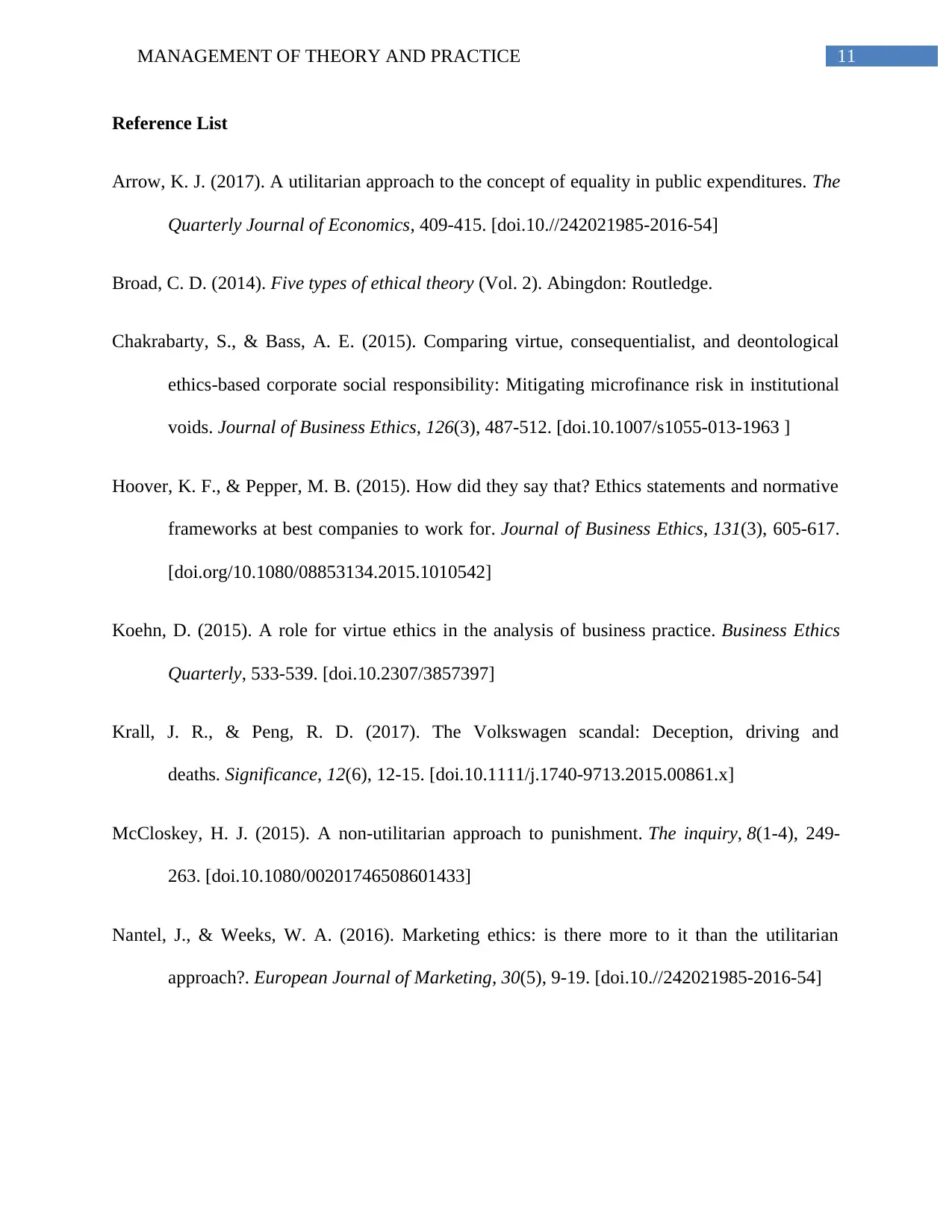
11MANAGEMENT OF THEORY AND PRACTICE
Reference List
Arrow, K. J. (2017). A utilitarian approach to the concept of equality in public expenditures. The
Quarterly Journal of Economics, 409-415. [doi.10.//242021985-2016-54]
Broad, C. D. (2014). Five types of ethical theory (Vol. 2). Abingdon: Routledge.
Chakrabarty, S., & Bass, A. E. (2015). Comparing virtue, consequentialist, and deontological
ethics-based corporate social responsibility: Mitigating microfinance risk in institutional
voids. Journal of Business Ethics, 126(3), 487-512. [doi.10.1007/s1055-013-1963 ]
Hoover, K. F., & Pepper, M. B. (2015). How did they say that? Ethics statements and normative
frameworks at best companies to work for. Journal of Business Ethics, 131(3), 605-617.
[doi.org/10.1080/08853134.2015.1010542]
Koehn, D. (2015). A role for virtue ethics in the analysis of business practice. Business Ethics
Quarterly, 533-539. [doi.10.2307/3857397]
Krall, J. R., & Peng, R. D. (2017). The Volkswagen scandal: Deception, driving and
deaths. Significance, 12(6), 12-15. [doi.10.1111/j.1740-9713.2015.00861.x]
McCloskey, H. J. (2015). A non‐utilitarian approach to punishment. The inquiry, 8(1-4), 249-
263. [doi.10.1080/00201746508601433]
Nantel, J., & Weeks, W. A. (2016). Marketing ethics: is there more to it than the utilitarian
approach?. European Journal of Marketing, 30(5), 9-19. [doi.10.//242021985-2016-54]
Reference List
Arrow, K. J. (2017). A utilitarian approach to the concept of equality in public expenditures. The
Quarterly Journal of Economics, 409-415. [doi.10.//242021985-2016-54]
Broad, C. D. (2014). Five types of ethical theory (Vol. 2). Abingdon: Routledge.
Chakrabarty, S., & Bass, A. E. (2015). Comparing virtue, consequentialist, and deontological
ethics-based corporate social responsibility: Mitigating microfinance risk in institutional
voids. Journal of Business Ethics, 126(3), 487-512. [doi.10.1007/s1055-013-1963 ]
Hoover, K. F., & Pepper, M. B. (2015). How did they say that? Ethics statements and normative
frameworks at best companies to work for. Journal of Business Ethics, 131(3), 605-617.
[doi.org/10.1080/08853134.2015.1010542]
Koehn, D. (2015). A role for virtue ethics in the analysis of business practice. Business Ethics
Quarterly, 533-539. [doi.10.2307/3857397]
Krall, J. R., & Peng, R. D. (2017). The Volkswagen scandal: Deception, driving and
deaths. Significance, 12(6), 12-15. [doi.10.1111/j.1740-9713.2015.00861.x]
McCloskey, H. J. (2015). A non‐utilitarian approach to punishment. The inquiry, 8(1-4), 249-
263. [doi.10.1080/00201746508601433]
Nantel, J., & Weeks, W. A. (2016). Marketing ethics: is there more to it than the utilitarian
approach?. European Journal of Marketing, 30(5), 9-19. [doi.10.//242021985-2016-54]
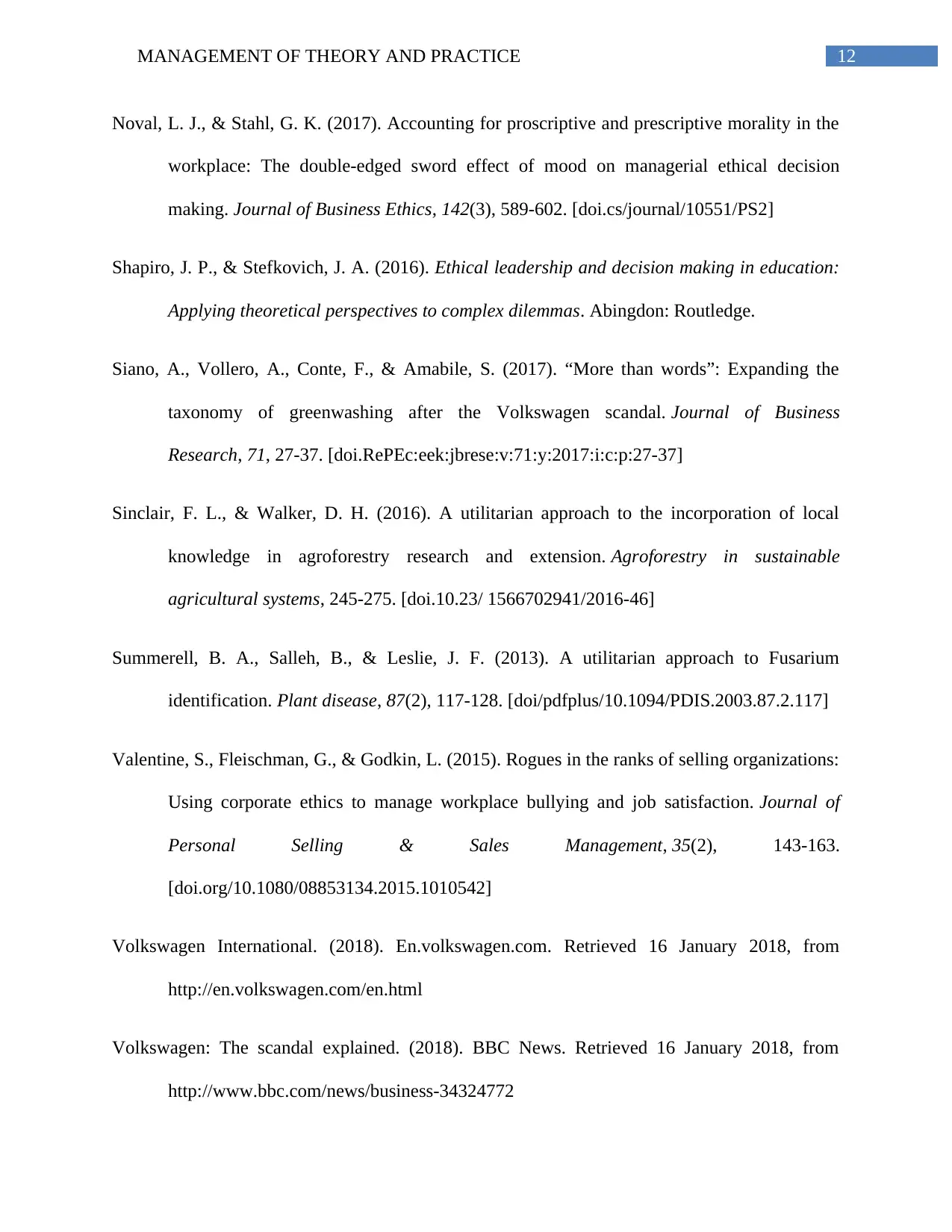
12MANAGEMENT OF THEORY AND PRACTICE
Noval, L. J., & Stahl, G. K. (2017). Accounting for proscriptive and prescriptive morality in the
workplace: The double-edged sword effect of mood on managerial ethical decision
making. Journal of Business Ethics, 142(3), 589-602. [doi.cs/journal/10551/PS2]
Shapiro, J. P., & Stefkovich, J. A. (2016). Ethical leadership and decision making in education:
Applying theoretical perspectives to complex dilemmas. Abingdon: Routledge.
Siano, A., Vollero, A., Conte, F., & Amabile, S. (2017). “More than words”: Expanding the
taxonomy of greenwashing after the Volkswagen scandal. Journal of Business
Research, 71, 27-37. [doi.RePEc:eek:jbrese:v:71:y:2017:i:c:p:27-37]
Sinclair, F. L., & Walker, D. H. (2016). A utilitarian approach to the incorporation of local
knowledge in agroforestry research and extension. Agroforestry in sustainable
agricultural systems, 245-275. [doi.10.23/ 1566702941/2016-46]
Summerell, B. A., Salleh, B., & Leslie, J. F. (2013). A utilitarian approach to Fusarium
identification. Plant disease, 87(2), 117-128. [doi/pdfplus/10.1094/PDIS.2003.87.2.117]
Valentine, S., Fleischman, G., & Godkin, L. (2015). Rogues in the ranks of selling organizations:
Using corporate ethics to manage workplace bullying and job satisfaction. Journal of
Personal Selling & Sales Management, 35(2), 143-163.
[doi.org/10.1080/08853134.2015.1010542]
Volkswagen International. (2018). En.volkswagen.com. Retrieved 16 January 2018, from
http://en.volkswagen.com/en.html
Volkswagen: The scandal explained. (2018). BBC News. Retrieved 16 January 2018, from
http://www.bbc.com/news/business-34324772
Noval, L. J., & Stahl, G. K. (2017). Accounting for proscriptive and prescriptive morality in the
workplace: The double-edged sword effect of mood on managerial ethical decision
making. Journal of Business Ethics, 142(3), 589-602. [doi.cs/journal/10551/PS2]
Shapiro, J. P., & Stefkovich, J. A. (2016). Ethical leadership and decision making in education:
Applying theoretical perspectives to complex dilemmas. Abingdon: Routledge.
Siano, A., Vollero, A., Conte, F., & Amabile, S. (2017). “More than words”: Expanding the
taxonomy of greenwashing after the Volkswagen scandal. Journal of Business
Research, 71, 27-37. [doi.RePEc:eek:jbrese:v:71:y:2017:i:c:p:27-37]
Sinclair, F. L., & Walker, D. H. (2016). A utilitarian approach to the incorporation of local
knowledge in agroforestry research and extension. Agroforestry in sustainable
agricultural systems, 245-275. [doi.10.23/ 1566702941/2016-46]
Summerell, B. A., Salleh, B., & Leslie, J. F. (2013). A utilitarian approach to Fusarium
identification. Plant disease, 87(2), 117-128. [doi/pdfplus/10.1094/PDIS.2003.87.2.117]
Valentine, S., Fleischman, G., & Godkin, L. (2015). Rogues in the ranks of selling organizations:
Using corporate ethics to manage workplace bullying and job satisfaction. Journal of
Personal Selling & Sales Management, 35(2), 143-163.
[doi.org/10.1080/08853134.2015.1010542]
Volkswagen International. (2018). En.volkswagen.com. Retrieved 16 January 2018, from
http://en.volkswagen.com/en.html
Volkswagen: The scandal explained. (2018). BBC News. Retrieved 16 January 2018, from
http://www.bbc.com/news/business-34324772
1 out of 13
Related Documents
Your All-in-One AI-Powered Toolkit for Academic Success.
+13062052269
info@desklib.com
Available 24*7 on WhatsApp / Email
![[object Object]](/_next/static/media/star-bottom.7253800d.svg)
Unlock your academic potential
© 2024 | Zucol Services PVT LTD | All rights reserved.





